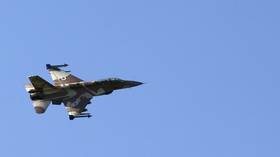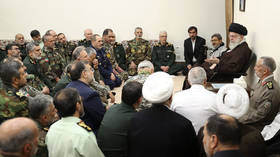Abbas Juma: Iran’s nuclear plans are clear. Just read its own Islamic law
Tehran’s doctrine is based on a fatwa Islamic law, which unequivocally prohibits indiscriminate weapons of mass destruction
In light of the direct conflict that broke out between Israel and Iran, rumors that the Islamic Republic could produce nuclear weapons began circulating again. In addition, just a few days ago Reuters and other media outlets quoted a senior commander of the Islamic Revolutionary Guard Corps (IRGC) saying that Iran may review its nuclear doctrine following Israeli threats.
The US, EU, and Israel have long feared that Iran may produce nuclear weapons, and have used this threat to justify their actions against the Islamic Republic. However, it is important to understand that Iran’s nuclear doctrine is based on a fatwa (a ruling based on Islamic law) issued by the country’s Supreme Leader. According to this fatwa, the production of nuclear weapons is a sin. However, Iran’s opponents do not believe in the sincerity of this ruling and, they suggest, it can be renounced at any time.
Things are not that simple
On April 17 and 18, the first Tehran International Conference on Disarmament and Non-Proliferation took place. The motto of this conference was “Nuclear energy for everyone, nuclear weapons for no one.” There, Ali Akbar Velayati, adviser to the Supreme Leader of Iran, read Ayatollah Khamenei’s message in front of officials and members of various international delegations and organizations.
“All of you know that, in the absence of the Imam Mahdi, whose coming is expected by the Shiites, the Shiite legal system is based on the opinion of authoritative and highly competent experts in the field of Islamic law (which Iran’s decisions are based on). These religious scholars issue fatwas which clearly indicate whether any action is permissible or not. One [important] issue is the permissibility of the production and use of weapons of mass destruction (chemical, biological, and nuclear weapons) …”.
Ayatollah Khamenei had carefully analyzed the consequences of the use of nuclear weapons by the Americans in Japan as well as the use of chemical weapons against Iran during the Iran-Iraq war, and stated his position on this issue:
“We believe that, besides nuclear weapons, other types of weapons of mass destruction, such as chemical and biological weapons, also pose a serious threat to humanity. The Iranian nation, which is itself a victim of chemical weapons, feels more than any other nation the danger that is caused by the production and stockpiling of such weapons, and is prepared to make use of all its facilities to counter such threats. We consider the use of such weapons as haraam [forbidden] and believe that it is everyone’s duty to make efforts to secure humanity against this great disaster.”
In the period from 2010 to 2015, other religious authorities, such as ayatollahs Makarem Shirazi, Jafar Subhani, Noori-Hamedani, and Javadi Amoli, also issued fatwas that prohibited the production and use of weapons of mass destruction.
But can the issued fatwas be changed or canceled? Can Iran’s position in this regard change? From a theological point of view, certainly not. Islamic law states clear reasons for this.
Why Iran can’t produce nuclear weapons
Nuclear weapons and the radiation which results from their use threaten the environment, causing the destruction of crops and the death of offspring. Verse 205 of Surah al-Baqarah says: “And when he goes away, he strives throughout the land to cause corruption therein and destroy crops and animals. And Allah does not like corruption.”
The protection of the environment, the preservation of the life of living beings and plants is every Muslim’s obligation under Sharia, Islamic law. The production and stockpiling of nuclear weapons, even if they are never used, may endanger the lives of people on the planet as a result of human error. According to Islamic law, this is unacceptable.
Islam believes that a victory must be achieved by reasonable, lawful, and humane means.
As for the rules of warfare, Islam strictly prohibits the killing of civilians, women, children and the elderly, as well as attacks on civilian infrastructure.
Here are the main principles of warfare in Islam:
First, there must be a clear division between military personnel and civilians. Secondly, civilians should not be targeted. Then, weapons that are used in the attack must correspond to the desired (military) goal. Appropriate weapons must be used to strike military targets. The fourth principle is the principle of necessity. The production, stockpiling, and use of nuclear weapons contradicts all four principles of warfare.
Many hadiths, which are sayings or traditions of the Islamic Prophet Muhammad, also prohibit harming nature and people who cannot defend themselves. For example, Ali ibn Abu Talib (cousin and son-in-law of the Prophet Muhammad) said that the Prophet prohibited adding toxic substances to water – even to the enemy’s water sources – since this may harm civilians.
Are there loopholes?
Iran advocates agreements which would prohibit the production, proliferation, and stockpiling of weapons of mass destruction, and generally accedes to such treaties. Iranians can lay claim to remaining faithful to the signed agreements – unlike Americans, who signed a nuclear deal with Tehran under one president then unilaterally withdrew from it when the administration in the White House changed.
Some people say that Iran is a Shiite country, and in Shia Islam there is a concept called taqiyya, which allows one to conceal one’s beliefs, convictions, etc. in the face of danger. Its critics say Iran covers up its aggressive intentions with false humane and religious principles. This idea is fundamentally wrong, since taqiyya concerns only the fact of protecting and preserving one’s religion – for example, if Muslims are in danger of being killed for their religious beliefs.
Taqiyya is prohibited if humanity is in danger of being destroyed, or if it contributes to the spread of iniquity and unrest. Therefore, taqiyya is not applicable to the production of nuclear weapons.
Based on Islamic law, the Supreme Leader of Iran made a definitive decision to ban the production and use of weapons of mass destruction. The US, Israel, and European countries know this very well. At the same time, Iran needs peaceful nuclear energy – and there is nothing dangerous or reprehensible about this.
The statements, views and opinions expressed in this column are solely those of the author and do not necessarily represent those of RT.







Comments are closed.